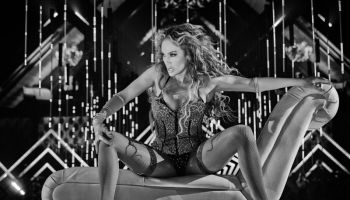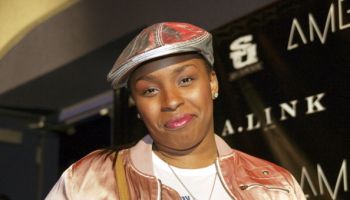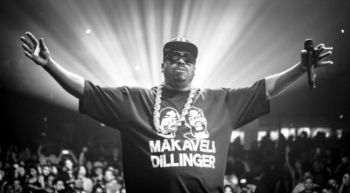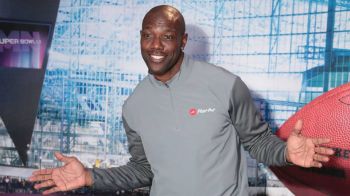BlackDoctor.org: How did you view your own beauty as a child/young woman?
Danielle: For a while, I hated it. Mostly my nose, my thighs and my hair. There was a point when I literally aspired to be a video girl because they were portrayed as the most desirable entity in black culture.
I also experienced subtle self-consciousness when I saw shows like Living Single, Girlfriends, Moesha and Sister, Sister, because even though the shows were made for us, they rarely casted someone who looked like me. They either had a small nose and thick lips, or were racially ambiguous.
 In major movies, the darker sisters were always somewhere in the background or playing a slave, a mammy or some other stereotype. Sometimes they were just plain mute. They had no voice.
In major movies, the darker sisters were always somewhere in the background or playing a slave, a mammy or some other stereotype. Sometimes they were just plain mute. They had no voice.
The song “Unpretty” by TLC & the Miseducation of Lauryn Hill did a lot for me, in regards to how I viewed my beauty. When they first came out, it was cool to sing along, but years later, I really internalized the music and truly stopped caring about the perceptions of others.
BlackDoctor.org: Has colorism affected your dating life? How do Black men typically regard you?
Danielle: Colorism can play a huge role in dating. I don’t actively date and tend to focus on my schoolwork above all. Growing up, I was constantly made fun of for my looks which would either result in ignoring people, cracking jokes, or if it got really bad, fighting.
Entering the dating scene, I would sometimes think, “Why does this person like me? Do they really find me attractive, are they using me?” All of those thoughts are based in fear and can drive a person crazy and lead to a life of not dating. (Hence my heavy emphasis on school work).
In my experience, black men are either enamored with my features and think I’m the most adorable person ever, or are simply not attracted because I’m not their preference.
BlackDoctor.org: Why do believe some Black men have such strong and negative responses to women with strong African features and attributes?
Danielle: They weren’t born that way; they were taught what to hate.
We, as Black people, have been conditioned as a people. Black people have been taught to hate ourselves and our features centuries ago. The conditioning began as a tool of social conditioning created to instill inferiority among people of color, but it has tremendously evolved. It is flourishing throughout the race and throughout the world. It is reinforced through the media. We don’t even have to be explicitly told that we’re ugly anymore. Everything around us does it for us.
So unless we individually break out of the matrix that praises the European standard of beauty, we will continue to do everything possible to claw our way to the top. As long as we can look down at someone else and say “I’m not as ugly or undesirable as that person, I’m okay”. That is a problem on so many levels.
BlackDoctor.org: How did you become involved with the EliteDaily video? Did you imagine the finished video would create this type of backlash against you?
Danielle: Chris and I did the video for fun. He’s been getting called back for a lot of projects and shows. When Elite Daily called him back, they said that they wanted him to bring his ex. Him and I are still best friends and work together a lot, so we went in together to do the video. We were both waiting for it to release to have a good laugh, I never expected that kind of response. People were brutal, calling me a “b*tch”, “guerilla”, “the dirt under their fingernails” and likening me to nothing more than a sexual object, because according to them, my face was such an offense that [Chris] could not have possibly seen anything else in me.
How ignorant, misguided and rude of them.
I don’t think anyone expects that kind of backlash, ever. But I’m glad it did. It brings to light the need for social commentary and conversation that needs to happen.
Watching the video play back, I realized one thing was that the lighting and coloring (bright fuchsia background) was scaled for light skin, not darker hues. That’s not surprising because we were the only black pair on screen, but I do find it interesting because it touches on a bigger discussion of how media does subtle things to abate the beauty of black people, even when they don’t notice it.
BlackDoctor.org: What were some of your immediate thoughts after reading through the comments?
Danielle: At first, the comments were a bit hurtful and very unnecessary. But as I scrolled and scrolled, they became more shocking than they were painful. I started wondering if this is what people really thought of me on a daily basis.
But then I really started to understand how hurt people are, particularly ones who come all the way to YouTube to leave hurtful comments. To have an opinion is one thing, but to take the time to go under a YouTube video and publically bash someone for their appearance shows more about the commenter’s personality and lack of self-love.
The commenters are misguided and are playing a game of, “how can I make someone feel inferior to me?” That’s all. I hope they eventually see the light and learn who they are.
BlackDoctor.org: Are you glad you did the video?
Danielle: I love that I did the video. It was fun for me & Chris and it turned into a larger social commentary. He took a bit more offense to the comments than I did, but the conversation needs to happen. There are a lot of young kids coming up facing the same issues I did and still do, but living in an era of technology.
Millennials, in the internet age, are living amongst an evolution of self-hate. What makes it so dangerous is that people feel as if they can say anything they want behind a computer screen and not face consequences. The first part is true; they can say what they want.
However, the feeling of not being accountable takes away the opportunity to learn a serious lesson and really get to know themselves.
Eventually people need to understand what drives their need to make someone feel inferior. It’s too easy nowadays to ignore that and continue digging a hole of confusions, fear and self-hate.
Years ago, people of darker complexions faced discrimination in a variety of ways, such as the paperbag test. Such face-to-face interactions evoked emotions between the parties that are, contemporarily, unfelt by those hiding behind a computer screen. Lack of accountability and emotion, evolves the level of response. I hate to hear about kids and young adults resorting suicide and self-infliction because they were “cyberbullied”. Until last night, I didn’t understand how strong the impact of words on the internet could hit.
BlackDoctor.org: What do you want people to take away from this video and this larger conversation? What is your message to Black women in particular?
Danielle: I want people to chill out and learn to let go of their fears. We go through enough strife with everything we have to face in the world. Stop tearing each other down and spreading hate in a false sense of self-empowerment.
********
When Danielle isn’t in school, she does freelance photography for hip-hop festivals and media outlets. One of the first celebrities she had the pleasure of shooting was Erykah Badu and Danielle recalls that Badu once told her after a show, “hate for anything stems from a source of fear of something.”
With one look at Danielle’s online portfolio that captures Black beauty in all its fullness, it’s evident she is dismantling the fear of our own innate beauty one dope pic at a time.
When asked to finish the statement “My Black is beautiful because….,” she simply states “it is unapologetic.”
Can We Talk About Colorism: Meet The Young Woman Cyberbullied After Appearing In A Popular Video was originally published on blackdoctor.org















